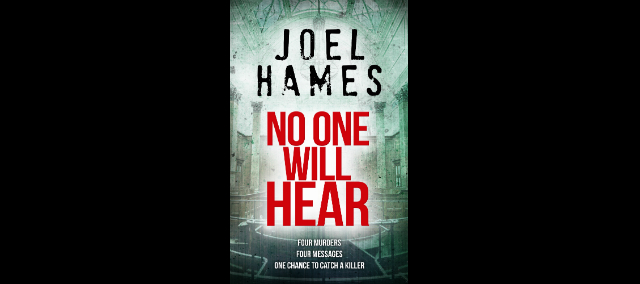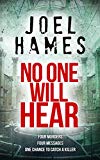The Inspiration Behind No One Will Hear by Joel Hames
Silence. It’s one of those words that conjures a million different connotations. Silence is golden, isn’t it? But sometimes silence can bring out the worst in us. It can leave us questioning our own minds.
What happens when a person has something to say, something important, and can’t – for whatever reason?
Silence can be bottling things up. Not picking that fight with your partner because you don’t have the energy, or you’re scared where it might lead.
It can be not complaining because you don’t want to seem like a whinger or not telling anyone about the significant issues happening in your life because you don’t think they’ll care, or, conversely, because you think they’ll care too much.
Silence can trap you in a box – not literally – can assign you a role and a life you don’t really fit into, your real voice lost, crying silently and alone.
As an author, there is nothing I love more than picking apart the ideas that gnaw away in the back of our subconscious minds, and these insecurities play so well in the pages of a crime novel.
No One Will Hear explores each of these issues wrapped up in a crime novel navigated by my leading character, lawyer Sam Williams.

Sam returns in this my fifth installment. As with most protagonists, Sam has a few flaws, his main one being he tends to find himself in the wrong place at the wrong time… all the time.
The idea of silence and voiceless victims is not a concept that evolved for me simply for this novel. I have always been interested in the concept. I studied English Literature back in the 90’s and one image that stuck in my mind, carried through from Ovid’s Metamorphoses through to Shakespeare’s Titus Andronicus (a play so violent it would be rejected by the producers of Game of Thrones on the grounds of brutality) was that of the severed tongue. In this tradition – a violently misogynistic tradition – women are invariably raped, their families often murdered, and they are silenced in the most physically obvious way imaginable. Their tongues are severed. Silence was a physical conclusion as well as a mental prison.
In all of the source literature, it’s equally obvious that this physical silencing is allegorical, but I’m not going to pretend that Ovid and Shakespeare were starting a pre-Twitter #MeToo movement. Far from it. Women are brutalised and silenced in literature, and as readers, although we are meant to feel for them, to tut and shake our heads, we are then expected to move on. Because the brutalisation and the silencing is an entertainment. Part of a plot. Something to keep us watching or reading while we wait for the villains to get their comeuppance.
It’s not just literature that does this, of course, the film industry encourages it also. Take Lethal Weapon 2, for example, when Patsy Kensit’s character is drowned just so we can root for Mel Gibson and Danny Glover all the more as they take out the bad guys.
For No One Will Hear, I wanted something more for my readers.
I wanted someone silenced to sing, finally – and not, as Ovid had it, to get turned into a bird first.
I wanted this to be the point, the silencing, the trauma of it, the bottling and the anger and the putting of lives in boxes. I wanted it to be about more than the whims of the gods or the revenge on the bad guys.
And so I wrote a novel that begins with the reading of a will – the words of the silenced dead, revived.
A novel that silences both its victims and its heroes, that has people living lives even those closest to them don’t really see. A book that has its fair share of tragedy, for sure, but sees its way through to something different.
I hope, if you read No One Will Hear, that you’ll see some of this in it. But most importantly, I hope you enjoy it, whether it’s for the plot or the characters or this theme of silence. Because at the end of the day, it’s a crime thriller. It needs pace, some good twists, tension, excitement, and a decent plot, and I like to think it’s got them. Everything else is just a bonus.
(Note from the Editor: We would like to thank Joel for joining us on The Glass House today and sharing the inspiration behind his latest novel.
For those aware of Joel’s previous work, No One Will Hear sits neatly behind his previous novel Dead North – but have no fear, for those of you who are intrigued by this book but have not previously read any of Joel’s novels, this can be read as a stand-alone. So now you have no excuse not to dive right in!
To read more about Joel and his work, you can follow him on Facebook, Twitter, or of course read more about his other books over on his personal website and of course, don’t forget to pop over and pre-order No One Will Hear .)









